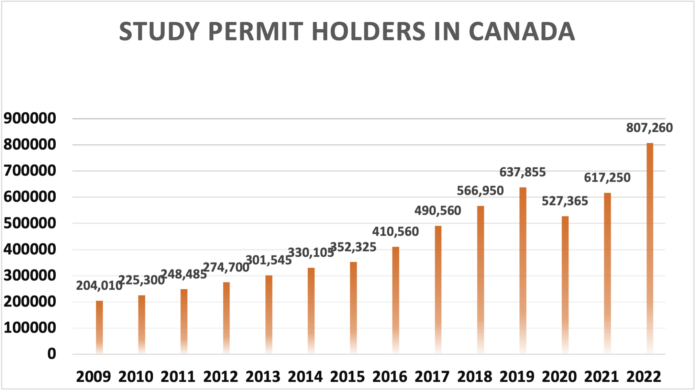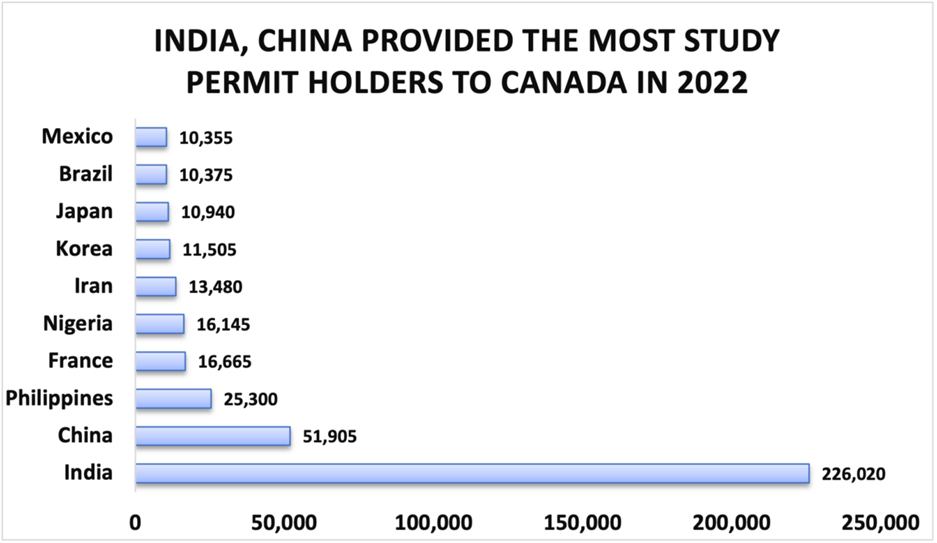Canada’s international student population is set to reach an impressive milestone, projected to hit one million by the end of this year. This surge in numbers is based on recent data released by Immigration, Refugees, and Citizenship Canada (IRCC). According to their statistics, there were 807,260 study permit holders in Canada as of December 31 last year, reflecting an astounding increase of nearly 30.8% from the previous year’s figure of 617,250 study permit holders in 2021.

The momentum hasn’t slowed down in 2023 either, as the IRCC has already issued 201,155 study permits in the first five months of this year. This remarkable figure represents a growth of approximately 20.4% compared to the same period in the previous year.
It’s no wonder that studying in Canada is gaining popularity among international students. Yocket, an online platform catering to students aspiring to study abroad, hails Canada as a fantastic student experience. The country’s welcoming stance towards immigrants and the plethora of benefits they offer make it an enticing choice for those seeking educational opportunities abroad. Aspiring students are encouraged to consider studying in one of Canada’s finest student cities and subsequently apply for a Post-Graduation Work Permit (PGWP) to facilitate a smooth transition into the workforce after graduation.
The allure of Canadian universities is well-established, as they consistently rank among the best in the world for their quality of education. Notably, the University of Toronto (UofT), the University of British Columbia (UBC), and McGill University secured positions among the top 100 in the ninth annual Best Global Universities rankings. Furthermore, an impressive 15 other Canadian universities earned spots in the top quarter of the 2,000 universities evaluated, further validating the country’s academic prowess.
International students who plan to pursue their studies in Canada should familiarize themselves with the country’s educational system before embarking on their journey. Understanding the nuances of the Canadian education system can better prepare them for a successful and fulfilling academic experience.
Graph of Countries with The Most Study Permits

Successful Study Permit Applications Require Acceptance to Designated Learning Institutions (DLIs)
In Canada, the educational landscape is diverse, with each of the 10 provinces and three territories governing its own system. For comprehensive information about schools in these regions, reaching out to the individual education ministries proves to be a valuable approach. The Canadian Information Centre for International Credentials serves as a helpful resource, providing contact details for each respective ministry.
For international students seeking detailed insights into Canadian schools and educational systems, EduCanada serves as an excellent federal government website. This platform facilitates students in their search for suitable study programs, offers cost estimates, assists with scholarship applications, and aids in planning their lives in Canada.
As a general guideline, Canada typically organizes its education system into primary schools catering to students up to Grade 6, followed by middle schools accommodating Grades 7 and 8, and finally, secondary schools accommodating Grades 9 through 12. However, it’s essential to note that there may be some variations in this structure from one province to another.
One of the critical factors that international students must bear in mind is that their chosen educational institution must be a Designated Learning Institution (DLI) for their study permit to be valid. These DLIs are educational establishments approved by the provinces and territories to admit international students, encompassing all primary and secondary schools across Canada.
For a comprehensive list of post-secondary institutions, including colleges, universities, and language schools designated as DLIs in each province and territory, international students can refer to the federal government’s official website.
Aspiring students must be aware that not all DLIs and study programs automatically qualify them for a Post-Graduation Work Permit (PGWP), which is often a significant consideration for those planning to work in Canada upon graduation. Therefore, it is crucial for students to thoroughly research and verify the eligibility criteria of their chosen DLI and program before commencing their studies.
By ensuring they select a recognized DLI and an eligible program, international students can enhance their prospects of securing a PGWP and pave the way for a successful career journey in Canada.
Revisions to PGWP-Designated Institutions in Quebec Set for September
The Immigration, Refugees, and Citizenship Canada (IRCC) emphasize that in addition to graduating from a PGWP-eligible designated learning institution (DLI), meeting all other criteria is essential to qualify for a post-graduation work permit.
Periodically, changes are made to the eligibility requirements for the Post-Graduation Work Permit (PGWP), and some of these changes will take effect in the upcoming school year for certain programs at DLIs in Quebec. However, students who complete their programs before September 1 this year will not be affected by these changes.
For those who commence their programs after the mentioned date, the option to apply for a PGWP will be limited to those who graduate from subsidized programs that remain eligible for the permit after September 1, 2023. The IRCC advises that if a student is enrolled in a program that will no longer be eligible for the PGWP after the stated date, the time spent studying in that program before September 1, 2023, may still be considered towards a future PGWP application.
After selecting a school, college, or university in Canada, international students must apply and adhere to the institution’s admission requirements. It’s crucial to be aware that admission fees can significantly vary from one educational establishment to another. These application fees typically range from $50 to $250 for universities, as mentioned by Yocket. However, students should note that these fees are non-refundable, meaning they won’t be reimbursed if they are not accepted or decide not to confirm their offer at a particular college.
To ensure a smooth process, Canadian immigration officials recommend applying at least six months in advance for primary or secondary school enrollment and one year in advance for post-secondary programs at universities or colleges. It is essential to get in touch with the chosen educational institution to learn about the application process, the required documents, and details concerning application fees, tuition fees, health insurance, accommodation costs, language tests, and other relevant information.
Once a college or university extends an acceptance letter to an international student, the application for a study permit should be made. This is typically done online. However, individuals with disabilities or other barriers hindering them from applying online can request an exemption and submit a paper application.
For students applying to schools in Quebec, along with the acceptance letter, they will also receive a Certificat d’Acceptation du Québec (CAQ), which must be included in their study permit applications. This document is a crucial part of the application process for studying in Quebec.
Vital Advice for International Students on Sufficient Health Coverage
International students bear the sole responsibility for their healthcare expenses, as both Canada and the provinces do not cover medical costs for foreign students. The extent of health coverage available to international students varies across different provinces.
Securing adequate medical and health insurance is of utmost importance for international students. In emergencies, many clinics and hospitals demand upfront payment for treatment, and insurance companies may only reimburse these expenses at a later stage.
To obtain detailed information about medical coverage and health insurance options, international students are strongly advised to contact their respective schools.
Additionally, students seeking entry into Canada through the Student Direct Stream (SDS) must demonstrate proficiency in either English or French. The International English Language Testing System (IELTS) serves as the preferred English proficiency test, requiring students to achieve a score of 6.0 or higher in each language skill: listening, reading, and speaking.
For francophone students, a Test d’Évaluation de Français (TEF) score equivalent to a Canadian Language Benchmarks (CLB) score of at least seven for each ability is mandatory.
By ensuring they have adequate health insurance coverage and fulfilling language proficiency requirements, international students can better prepare themselves for a successful and secure academic journey in Canada.
Need Help Immigrating to Canada?
